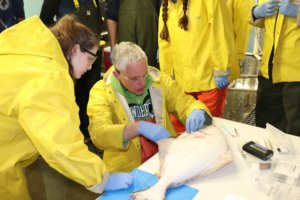- University of Guelph, B. Sc. Major in Marine Biology, Minor in Human Nutrition
Growing up in Ontario, Canada I was always drawn to nature and all things water. My family has always teased me about my exuberant curiosity and incessant asking of the question “Why?”, behavioral attributes that have never faded and that continue to serve me well. After graduating from University, I moved to British Columbia, first working as a fisheries observer, and then moving into the monitoring of fisheries using electronic technologies, and fisheries data management. In 2001 my career took to me to Seattle, WA to manage the Fishery-Independent Setline Survey for my current employer, the International Pacific Halibut Commission (IPHC). More recently I transitioned into a Research Biologist position and found myself interested in further developing my statistical analysis and research skill set. The FAST Lab has made returning to school later in life a positive, engaging, and exciting experience.
My research is focused on estimating and predicting discard mortality of Pacific halibut (Hippoglossus stenolepis) released after capture. This involves studying typical catch and release methods employed in various fisheries, classifying injuries incurred in the process of capture and release, understanding the physiological stress mechanisms involved in mortality, and examining pre-capture fitness effects on survival outcomes. These investigations will better enable managers to estimate mortalities while developing scientifically based best practices to maximize capture and release survival.
Funding for this work is provided by the International Pacific Halibut Commission, a Saltonstall-Kennedy grant, and a merit scholarship from At-Sea Processor’s Association.



